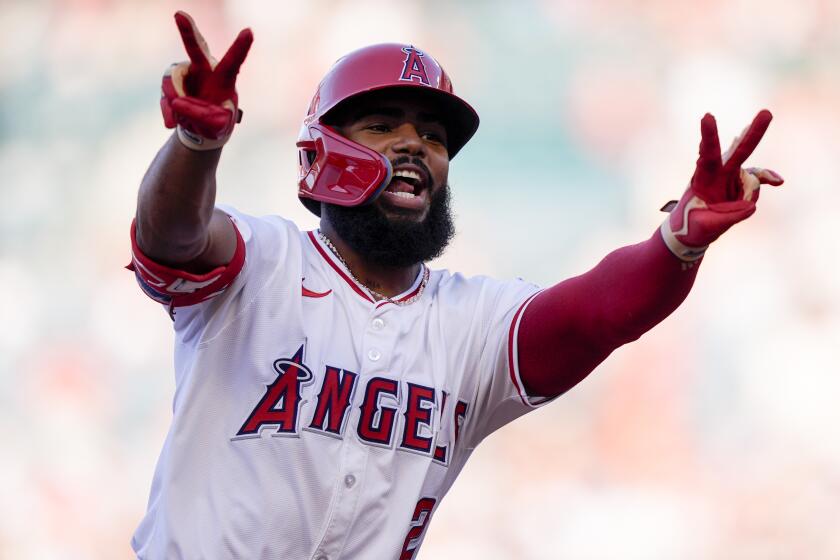Orioles Crowd Is Defiantly Optimistic
- Share via
BALTIMORE — The huge words etched on the facade of Baltimore’s Memorial Stadium say, “Time Will Not Dim the Glory of Their Deeds.” That patriotic rhetoric refers to those who died in battle, but, in a more modest sense, the words apply to the Baltimore Orioles who, from 1960 through 1985, had only two losing years and won far more games than anybody.
It was a long run of true excellence--625 games over .500, or an average of 25 more wins than loses every year for a quarter of a century. Except for the Yankees, who held it together for more than 40 years, it was a streak that would bear comparison with almost any.
Those days were finally, and almost formally, laid to rest in a wild and silly wake Monday night on 33rd Street as a crowd of defiantly optimistic Oriole fans celebrated their club and its amazing won-lost record: 1-23.
Or, as the bleacher sign had it, 139-23.
Have so many ever cheered so much for a team so bad? From the moment Morganna the Kissing Bandit (Frank Howard, RFK, 1969) bussed Cal Ripken on his demurely proffered cheek, the order of the night was foolishness. On the next pitch, the Texas Ranger hurler balked. Then, Ripken struck out. Maybe Morganna proved once again that the legs go first, but all her pizazz wasn’t lost.
In his next at-bat, Ripken homered to break a scoreless tie and the curiously ambiguous festivities began to erupt. Roars of near World Series force rolled over the meaningless game as the crowd had decided, for one night, to suspend reality and recreate a scene-complete with nostalgic chants of O-R-I-O-L-E-S from many a pennant race past. Yes, it was weird--as strange as a Fantastic Fan promotion arranged by a team to celebrate its own lousiness. Anything for a buck? However, it was also a night of lovely innocence. Hey, let’s go see those poor lugs and give ‘em a boost.
In a sense, this night was a burial: for the false hopes of the past four seasons. Then, every shortfall finish was greeted with more big bucks paid to more fading stars from other towns. Monday afternoon, in a symbolic statement of the club’s decision--finally--to rebuild slowly and from the bottom, the Orioles released Scott McGregor, eating the $1.97 million left on his contract to give a younger pitcher a chance.
Once, McGregor was the emblem of the Orioles intelligence and their almost “magical” ability to surpass their apparent skills. With a fastball that Billy Martin said couldn’t black his eye, McGregor won the two showcase games of his Oriole generation--the ’79 American League pennant clincher and the last ’83 World Series victory.
Then, in the days when every Orioles virtue shone in the sun, McGregor was seen as poised and unselfish; he once signed for $200,000 less than the team offered to help “sign the other guys.” As he and the team aged, his flaws, like every Oriole flaw, came into the glare of criticism. McGregor did not change nearly so much as the Orioles world around him changed, drawing him down with it. The little left-hander was never much on physical conditioning and his composure didn’t go very far once the defense behind him deteriorated; his margin of error, never much, evaporated, and with it his confidence. Once more, he stood for his whole team.
In a much larger sense, however, this whole evening was a collective wish for rebirth--if not in 1988, then someday. Owner Edward Bennett Williams, never one to miss a fecund moment, chose the pregame ceremonies to reveal, through that willing tool Gov. William Donald Schaefer, that the Orioles had signed a 15-year lease to stay in Baltimore. Three more years in Memorial Stadium, then on to Camden Yards, where ground can now be broken.
Some might say that Williams, having twisted enough arms to get not only a state-built $100 million park but concessions on scoreboards and luxury boxes, finally decided to get a little good publicity with the timing of his tease-’em-and-wait lease signing.
Of course, maybe Williams just wanted to give the whole crowd a warm wonderful hug for their generosity.
What really warmed the throng’s chilly heart on a spring night was the sight of rookie Keith Hughes cracking three straight hits and rookie Pete Stanicek sparking a five-run game-breaking rally with a clutch hit. Was that a new Oriole, Jay Tibbs, getting the victory? Was frisky young Billy Ripken, just back from a beaning, on base or turning a double play every time you looked up? And what about that other promising rookie, Craig Worthington, scooping up shots at third?
When a team that has batted around once all season bats around twice within three innings, self-delusion is the only proper response for a baseball fan. Can Jose (Nine Runs and Three Balk) Guzman pitch on Tuesday night, too?
The Orioles could hardly believe the forgiveness, the promise of a fresh start, that was extended to them here in one of baseball’s strangest nights.
“I’m quite confused. Usually, when a team plays like this, nobody goes to the park. Nobody could care less,” said Billy Ripken. “I’m quite bewildered by 47,000 (pregame) tickets (sold).”
General Manager Roland Hemond, who’d make Norman Vincent Peale seem manic-depressive by comparison, gave the official cheerful, and perhaps correct, version of this spectacle. “Now I can understand why players have always been so proud to be Orioles and why so many move to Baltimore to live. I knew the reputation of people in this area, but this is beyond anything I’d imagined. It’s a display of the genuiness of these people. This is America at its best.”
For one night, when so many of their staunchest fans wanted so badly to be given any sliver of hope for the future, the Orioles had the good sense to play even better than their best.
More to Read
Go beyond the scoreboard
Get the latest on L.A.'s teams in the daily Sports Report newsletter.
You may occasionally receive promotional content from the Los Angeles Times.










